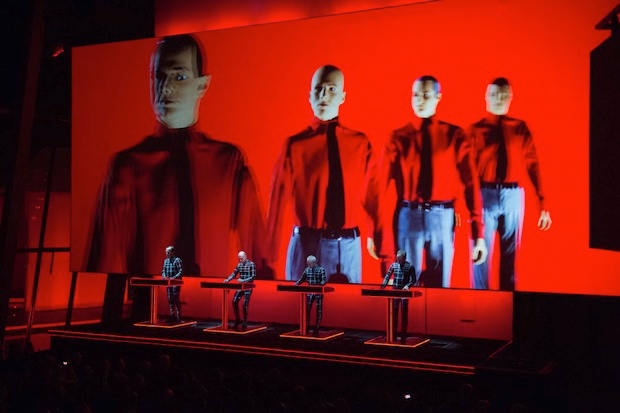Normally, few things in life are quite so tedious as listening to a bunch of academics discussing pop music. However this week’s Kraftwerk Konferenz at Aston University may be the chinwag that refutes this rule. Why so? Well, speakers includes former Kraftwerk member Wolfgang Flur, plus Stephen Mallinder from Cabaret Voltaire and Rusty Egan of Visage – remember them? OK, so these real-life pop stars are still outnumbered by a host of earnest academics, delivering lectures with mind-numbing titles like ‘Kraftwerk and the Issue of Post-Human Authenticity’ and ‘Kraftwerk and the Cultural Studies of Cycling’. However if any band can withstand two days of pointy-headed discourse, it must be Kraftwerk. Because, improbably, these po-faced kraut-rockers have become the most influential pop group of all time.
Forty-five years since they started out, Kraftwerk’s influence is everywhere, in every pop genre you can think of – and quite a few you can’t. David Bowie was first in line, bigging up Kraftwerk founder Florian Schneider on his Heroes LP way back in 1977. New Order sampled Schneider’s music on their snyth anthem ‘Blue Monday’. REM are one of hundreds of groups who’ve followed suit. Hip-hop, house and techno are inconceivable without Kraftwerk. They were the first band to embrace modern technology – not only on the instruments they played, but in the subject matter of their songs.
Today urban alienation is a common theme in pop music, and Kraftwerk’s mechanical cadences have become the soundtrack of our lives. Kraftwerk’s robotic house style is so ubiquitous, it’s almost become invisible. Yet back in the 1970s they seemed so avant-garde, it was almost impossible to take them seriously. ‘Are these people for real?’ I wondered, when my (much cooler) stepbrother brought home a copy of their landmark LP, Trans-Europe Express. ‘Surely they must be joking?’ With their neat haircuts and tidy shirts and ties, they looked like geeks, not rock gods. But then he put the record on the turntable (yes, we still had turntables back then) and I was entranced. The music was cold, clean and clear – and wonderfully harmonious. It was like listening to Bach or Mozart, performed by brilliant automatons.
My stepbrother bought up their back catalogue, and instructed me to listen in: Autobahn (1974) and Radioactivity (1975). This was a world away from our usual adolescent fayre: the cod mythology of prog rock concept albums, or Black Sabbath and Deep Purple, singing about the occult in Brummie accents. In 1978, Kraftwerk released The Man Machine, and their deadpan Teutonic wit broke through. They’d been witty all along, but, like most Brits, it took us a long time to get it. We finally got the joke in 1981, when ‘The Model’, the standout track on The Man Machine, was belatedly released as a UK single, and became Britain’s number one.
From then on, Kraftwerk spawned a host of acolytes: Soft Cell, Depeche Mode, the Human League and (a little later) the Pet Shop Boys. This era was, and still remains, the best that British pop has ever been – intelligent yet populist, ironic yet unpretentious. Silly critics dismissed Kraftwerk as soulless, but their best compositions were beautiful: ‘Europe Endless’, ‘Neon Lights’, ‘Computer Love’. Computer World (1981) was their finest LP, and Tour de France (1983) was their swansong, with a haunting melody so archetypal, you felt it had been there all along. Their more recent work doesn’t really rock my boat, but who cares? Those six LPs did more to shape modern music than anything since the Beatles. You can hear their echo in everything from Daft Punk to the Chemical Brothers to Coldplay.
But to really understand Kraftwerk, you have to go to Dusseldorf, where the band was formed, in 1970. Like most German cities, it was flattened by the RAF and rebuilt in a hurry, in an anonymous, functional style. This was the cityscape that shaped them, and the functionality and anonymity of their music is as much a portrait of a place as Hardy’s Wessex. As Kraftwerk’s Ralf Hutter once put it, ‘We are the children of Fritz Lang and Wernher von Braun.’ Apparently the Aston conference is already sold out. Never mind. Far better to book ahead for Kraftwerk’s concert cycle in Copenhagen at the end of February, where they’ll be performing all their albums back to back.






Comments